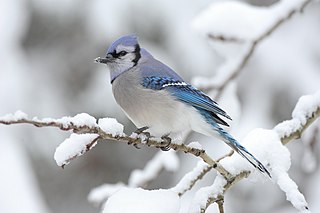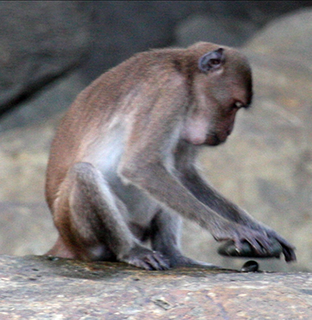Related Research Articles

Cognitive science is the interdisciplinary, scientific study of the mind and its processes with input from linguistics, psychology, neuroscience, philosophy, computer science/artificial intelligence, and anthropology. It examines the nature, the tasks, and the functions of cognition. Cognitive scientists study intelligence and behavior, with a focus on how nervous systems represent, process, and transform information. Mental faculties of concern to cognitive scientists include language, perception, memory, attention, reasoning, and emotion; to understand these faculties, cognitive scientists borrow from fields such as linguistics, psychology, artificial intelligence, philosophy, neuroscience, and anthropology. The typical analysis of cognitive science spans many levels of organization, from learning and decision to logic and planning; from neural circuitry to modular brain organization. One of the fundamental concepts of cognitive science is that "thinking can best be understood in terms of representational structures in the mind and computational procedures that operate on those structures."

Cognitive neuroscience is the scientific field that is concerned with the study of the biological processes and aspects that underlie cognition, with a specific focus on the neural connections in the brain which are involved in mental processes. It addresses the questions of how cognitive activities are affected or controlled by neural circuits in the brain. Cognitive neuroscience is a branch of both neuroscience and psychology, overlapping with disciplines such as behavioral neuroscience, cognitive psychology, physiological psychology and affective neuroscience. Cognitive neuroscience relies upon theories in cognitive science coupled with evidence from neurobiology, and computational modeling.

Cognition refers to "the mental action or process of acquiring knowledge and understanding through thought, experience, and the senses". It encompasses all aspects of intellectual functions and processes such as: perception, attention, thought, intelligence, the formation of knowledge, memory and working memory, judgment and evaluation, reasoning and computation, problem solving and decision making, comprehension and production of language. Imagination is also a cognitive process, it is considered as such because it involves thinking about possibilities. Cognitive processes use existing knowledge and discover new knowledge.

Corvidae is a cosmopolitan family of oscine passerine birds that contains the crows, ravens, rooks, jackdaws, jays, magpies, treepies, choughs, and nutcrackers. In colloquial English, they are known as the crow family or corvids. Currently, 133 species are included in this family. The genus Corvus, including the jackdaws, crows, rooks, and ravens, makes up over a third of the entire family. Corvids are the largest passerines.
Irene Maxine Pepperberg is a scientist noted for her studies in animal cognition, particularly in relation to parrots. She has been a professor, researcher and/or lecturer at multiple universities, and she is currently a research associate and lecturer at Harvard University. Pepperberg also serves on the Advisory Council of METI. She is well known for her comparative studies into the cognitive fundamentals of language and communication, and she was one of the first to work on language learning in animals other than human species, by extension to a bird species. Pepperberg is also active in wildlife conservation, especially in relation to parrots.

Comparative psychology refers to the scientific study of the behavior and mental processes of non-human animals, especially as these relate to the phylogenetic history, adaptive significance, and development of behavior. Research in this area addresses many different issues, uses many different methods and explores the behavior of many different species from insects to primates.

Animal cognition encompasses the mental capacities of non-human animals including insect cognition. The study of animal conditioning and learning used in this field was developed from comparative psychology. It has also been strongly influenced by research in ethology, behavioral ecology, and evolutionary psychology; the alternative name cognitive ethology is sometimes used. Many behaviors associated with the term animal intelligence are also subsumed within animal cognition.

The difficulty of defining or measuring intelligence in non-human animals makes the subject difficult to study scientifically in birds. In general, birds have relatively large brains compared to their head size. The visual and auditory senses are well developed in most species, though the tactile and olfactory senses are well realized only in a few groups. Birds communicate using visual signals as well as through the use of calls and song. The testing of intelligence in birds is therefore usually based on studying responses to sensory stimuli.
Comparative cognition is the comparative study of the mechanisms and origins of cognition in various species, and is sometimes seen as more general than, or similar to, comparative psychology. From a biological point of view, work is being done on the brains of fruit flies that should yield techniques precise enough to allow an understanding of the workings of the human brain on a scale appreciative of individual groups of neurons rather than the more regional scale previously used. Similarly, gene activity in the human brain is better understood through examination of the brains of mice by the Seattle-based Allen Institute for Brain Science, yielding the freely available Allen Brain Atlas. This type of study is related to comparative cognition, but better classified as one of comparative genomics. Increasing emphasis in psychology and ethology on the biological aspects of perception and behavior is bridging the gap between genomics and behavioral analysis.
Primate cognition is the study of the intellectual and behavioral skills of non-human primates, particularly in the fields of psychology, behavioral biology, primatology, and anthropology.
Sara J. Shettleworth is an American-born, Canadian experimental psychologist and zoologist. Her research focuses on animal cognition. She is professor emerita of psychology and ecology and evolutionary biology at the University of Toronto.

Some of the research that is conducted in the field of psychology is more "fundamental" than the research conducted in the applied psychological disciplines, and does not necessarily have a direct application. The subdisciplines within psychology that can be thought to reflect a basic-science orientation include biological psychology, cognitive psychology, neuropsychology, and so on. Research in these subdisciplines is characterized by methodological rigor. The concern of psychology as a basic science is in understanding the laws and processes that underlie behavior, cognition, and emotion. Psychology as a basic science provides a foundation for applied psychology. Applied psychology, by contrast, involves the application of psychological principles and theories yielded up by the basic psychological sciences; these applications are aimed at overcoming problems or promoting well-being in areas such as mental and physical health and education.
The Comparative Cognition Society (CCS) is one of the primary scientific societies for the study of animal cognition and comparative psychology. The CCS is a non-profit, international society dedicated to gaining a greater understanding of the nature and evolution of cognition in human and non-human animals.
David Andrew Whiten, known as Andrew Whiten is a British zoologist and psychologist, Professor of Evolutionary and Developmental Psychology, and Professor Wardlaw Emeritus at University of St Andrews in Scotland. He is known for his research in social cognition, specifically on social learning, tradition and the evolution of culture, social Machiavellian intelligence, autism and imitation, as well as the behavioral ecology of sociality. In 1996, Whiten and his colleagues invented an artificial fruit that allowed to study learning in apes and humans.
Cognitive biology is an emerging science that regards natural cognition as a biological function. It is based on the theoretical assumption that every organism—whether a single cell or multicellular—is continually engaged in systematic acts of cognition coupled with intentional behaviors, i.e., a sensory-motor coupling. That is to say, if an organism can sense stimuli in its environment and respond accordingly, it is cognitive. Any explanation of how natural cognition may manifest in an organism is constrained by the biological conditions in which its genes survive from one generation to the next. And since by Darwinian theory the species of every organism is evolving from a common root, three further elements of cognitive biology are required: (i) the study of cognition in one species of organism is useful, through contrast and comparison, to the study of another species’ cognitive abilities; (ii) it is useful to proceed from organisms with simpler to those with more complex cognitive systems, and (iii) the greater the number and variety of species studied in this regard, the more we understand the nature of cognition.
The g factor, or general factor, of intelligence is a psychometric construct that summarizes observed correlations between an individual’s scores on various measures of cognitive abilities. First described in humans, a g factor has since been identified in a number of non-human species.
Thomas R. Zentall is a professor of psychology at the University of Kentucky. His research focusses on learning and memory in non-human animals. A former president of both the Midwestern Psychological Association and the Eastern Psychological Association, Zentall has over 300 publications in peer reviewed journals. In 2014 Zentall was honoured by the Comparative Cognition Society for his contributions to the study of animal cognition.

Brian Hare is a professor of evolutionary anthropology at Duke University. He researches the evolution of cognition by studying both humans, our close relatives the primates, and species whose cognition converged with our own. He founded and co-directs the Duke Canine Cognition Center.
Evolution of cognition is the idea that life on earth has gone from organisms with little to no cognitive function to a greatly varying display of cognitive function that we see in organisms today. Animal cognition is largely studied by observing behavior, which makes studying extinct species difficult. The definition of cognition varies by discipline; psychologists tend define cognition by human behaviors, while ethologists have widely varying definitions. Ethological definitions of cognition range from only considering cognition in animals to be behaviors exhibited in humans, while others consider anything action involving a nervous system to be cognitive.

Insect cognition describes the mental capacities and study of those capacities in insects. The field developed from comparative psychology where early studies focused more on animal behavior. Researchers have examined insect cognition in bees, fruit flies, and wasps.
References
- 1 2 "Dr. Alan Kamil, UNL Center for Avian Cognition". Biosci-labs.unl.edu. Archived from the original on 2015-03-20. Retrieved 2013-11-18.
- ↑ "CCS Research Award". Comparativecognition.org. Retrieved 2013-11-18.